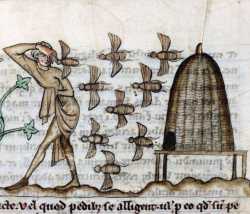>>2577491Hi anon. Congratulations on pursuing the apiarist arts.
Get good kit, and try and learn from an experience beekeeper. Join an association, education is important and seeing things is much easier to learn than just reading books alone.
Are you a small holder, or trying to make money from this? If it's just you trying to keep a few hives, then the costs should even themselves out, but you make money from pollination, not honey or wax. (more like spending money.) Orchards or farms are great places to have hive set ups, but also rooftops in cities. You can get funding from local councils since it preserves bio-diversity.
Bee's will take care of themselves, you really only need to check on them once a week, and make sure of a few things.
a) no signs of varoa mites, or wax moths. Treatments are different, varoa is easy to treat for and should be done regularly. Wax moths, you will need to destroy the frames in question.
b) The Queen is healthy and is laying eggs in the brooding combs, the pupae are healthy pearly white without deformities.
c) Is there any formation of play cups or queen cups. (more a spring time thing.)
Honey is a by product of the work the bees do, and so the healthier the hive, the more honey, you should always aim to leave them the vast majority of the honey they produce for over winter.
If you live in really cold climates, you should under no circumstances open up the colonies in winter, the bee's will keep themselves as warm as possible, they will survive if the honey stores are good and if they have good cover. (positioned near trees or some sort of wind break helps.)
When processing honey, make sure it's in a closed environment, honey smell to bee's is like crack to a crack addict. You can cut out the comb and add new frames, decap comb and add to a centrifuge. You will get some wax content in your honey adds a creamy consistency, it's cool the shits edible and good for you.

